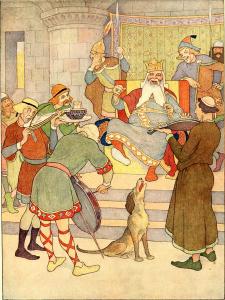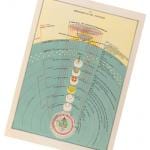 I was low and should have been.
I was low and should have been.
And then came a word from God and nothing external changed, but I was oddly cheered. That cheerfulness kept me alive.
It was all weird, not just unusual or funky, but in a very ancient sense of the term “weirdness.” Weird, you see, can mean a supernatural word, one that moves past reason to reality. I heard what this man said, he was known as a prophet, and he felt right. And it turned out so. Of course, as one does with any Weird Word, I put it “on the shelf” (as my wise Dad would put it) to wait and see what God would do. One does not act on the Word, one waits and sees. When the Word comes to pass, then comfort is the result.
“Ah.” I thought when it all happened, “This is that spoken of. . .” And so it goes.
When you hear the Weird, you know, or you think you know. The Weird Word penetrates, though of course you might have been deceived. One way to tell the good from the bad is that the good word stays around to be examined by reason and so can be tested while the evil word hides, refuses to discuss. The evil weirdling tries to undercut the dialectic, demands immediate action, credulity, and rebellion against the norms. The weird word that is evil comes to Macbeth through three sisters and destroys and like an opoid will not let the man go.
The good Word that comes for the man or woman of God pierces through all barriers and we hear what seems deeply true. The deep truth is mythical, fits some pattern of history. Virgins conceive, young women at first, say Eve, Sarah, Hannah, and then Mary, a true virgin, the Mother of God. The patterns continue: we are the Bride of Christ, are born again, and can be Emmanuel, God with us, to our own time.
The word comes often enough to everyone of us that secularism must work hard to guard against the reality. Write down the word, do nothing, wait and see. The good word will come to pass and you will know when the word becomes flesh. A delusion demands, coerces, refuses any sense of consent.
Plato understood this even as he advocated for the dialectic, the examined life. Plato knew that the good God, the Mind he did not know, yet guessed existed, sometimes spoke. This word started at the very bottom, the core of our being, and simply was there.
Dorothy Sayers understood this role, seer, prophet, weird word giver. She used it to good effect in her play “Constantine” in the figure of King Coel, a merry old soul. This ruler could call for a pipe, a bowl, and for his fiddlers three in order to speak a true word. The historical Coel was (almost certainly) not the grandfather of Saint Constantine the Great (equal to the Apostles!), but legend made him so.
Legend is not history and never should be confused with history. Legend is what “might have been” . . . an icon of history if history made better sense than it often does. Legend gives us Arthur, once and future king, the ruler Briton needed, but did not merit. Legend grants us good King Coel of Colchester and that merry old soul sires Helen who gives us Constantine.
Constantine the Great is the Christ-figure we needed, but imperfect. Dorothy Sayers takes legend and makes the factual emperor, Constantine, a weird legend. We read of the man who was not and see what we needed, need, and so hear the Word of the Lord.
This weird word begins in the basement of our souls and soars up throughout our entire nature.
Sayers knew that in reality the Word had become flesh and dwelt amongst us. She also knew that we had, are, and will misunderstand, miss, misapply what the Word said, did, and promised. As a result, divine fiction, the weird word, could come with characters like Peter Wimsey, his Bunter, and his bride to tell us a truth in an image. The detective novel is not literally true, but literarily true: the weird word.
Certain narrow souls, carefully, puritanically, refuting, refusing, refracting any true Light that is unknown to their philosophy refuse to look for the weird word. They make little boxes and live happily within them. God busts these boxes. That might be acceptable to the doctrinaire, if God also signed on to bust boxes that denied the spirit of the age.
We listened for the Word of the God, read the Word of God, experience the Word of God, and then one comes the Weird Word when He will. Come Holy Spirit. We need You.
Lord Jesus Christ, son of God, have mercy on me a sinner.
I am thankful to The College at Saint Constantine for the discussion on the Dorothy Sayers Play “Constantine” that motivated this short reflection.












